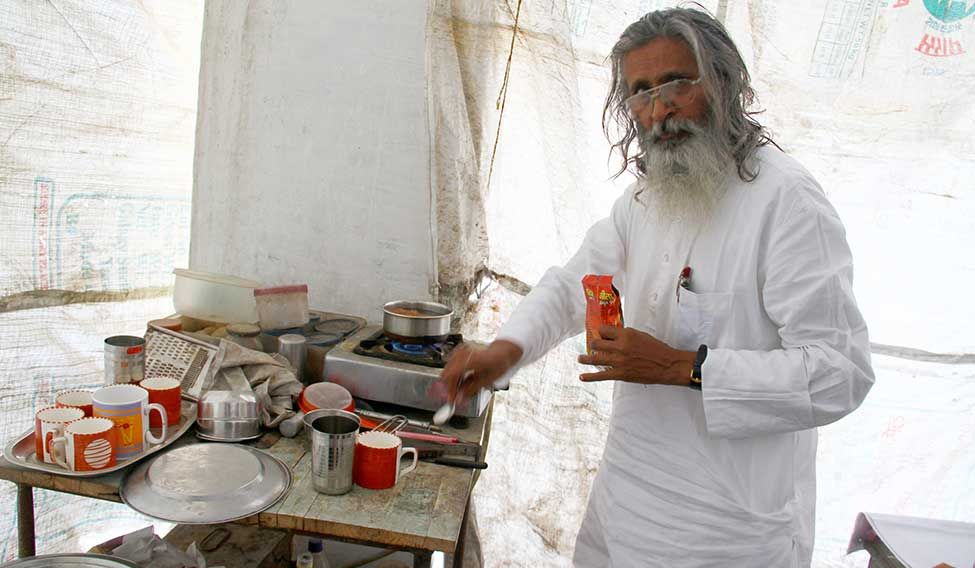It is hard to miss this shack made of coarse cloth near the Muzaffarnagar district magistrate's office in Uttar Pradesh. It looks like an installation art amid the dusty old buildings.
As we enter it, a lanky man with a flowing white beard greets us. “Come, come... this is my house,” he says, with a stoic smile. “This is the bedroom, this is the drawing room. Where would you like to sit?”
A coarse mattress is spread on the ground. On the other side, there is a rickety wooden table with a gas stove upon it. Newspapers occupy most of the remaining floor space. Well, there is hardly any place to sit!
'Master' Vijay Singh, 52, has been living here for 19 years. But this is no ordinary life, no ordinary dwelling. This is the venue of India's longest one-man dharna, according to the Limca Book of Records. Singh has been fighting a lone battle against land sharks of the state since February 26, 1996.
Singh's primary demand has been to free 4,000 bighas of government land in and around Chausana village near Muzaffarnagar usurped by “the land mafia—a nexus of politicians, land sharks and corrupt officials”.
He has so far been able to free 300 bighas worth more than Rs.20 crore. Now, the battle continues for the remaining 3,700 bighas.
Ruthless plunder by land sharks and their musclemen in Chausana had changed the course of Singh's life. He could not tolerate the fact that they could grab land from the poor with impunity.
Initially, Singh, who taught economics at a government school, had ignored the injustice like a typical middle-class man. But an incident changed his life. “One day, while returning home from school, I came across a little boy asking his mother whether he would get food that evening; he was pleading for roti.”
That woman, who used to lead a comfortable life, had apparently lost all her assets to the land mafia. “The next day, I quit my job and vowed that I will do something for my village, something to get the land freed,” says Singh.
He soon started researching land records in his village. He ate and slept at the land records office for almost a year.
“The period I covered was from 1948 to 1990. My research revealed who were the rightful owners and who were the illegal occupants.”
Singh smelt a multi-crore scam, and started writing to the authorities concerned. Soon, the mafia's hoodlums went after him. “There were many attempts on my life, but God kept saving me,” he says, with a smile.
During the previous government under Mayawati, the mafia stepped up the attacks. “I had no option but to go underground,” he says. “For a fortnight, I hid in trains. I would move from one small station to another, and sleep and bathe on trains or the platforms. I survived on puffed rice.”
So far, Singh has got 136 cases registered against land grabbers. In 2012, he walked 600km from Muzaffarnagar to Lucknow to meet Chief Minister Akhilesh Yadav. Though a government probe was ordered, it delivered nothing substantial, thanks to official sloth.
“In 19 years, I have written more than 1,500 letters to the authorities—from the DM [district magistrate] to the PM [prime minister]. Some action was initiated, but a lot more needs to be done.”
Land acquisition has become such a big issue, even as massive areas of government land have been usurped by the land mafia, he says. “If these illegal land holdings are seized, acquisition of farmers' land would not be needed. This is the case not just in Uttar Pradesh, but the whole of India.”
The people of Muzaffarnagar say within Singh's fragile frame is a determined fighter with a steely resolve. With his trademark smile, they add, he hides some indelible scars.
His son and two daughters shunned him. They live on Singh's 23 bighas, but do not want to be part of his struggle.
“It has been ages since I have seen them or received a call from them,” says the widower. “Earlier, my daughter used to visit and call me, but now even that has stopped. That's the price I had to pay for siding with truth.”
Singh, however, has no regrets. And vows to continue his struggle.
As we leave, he says he has been growing his beard for the past five years, and that he won't shave until he gets the remaining 3,700 bighas freed.








